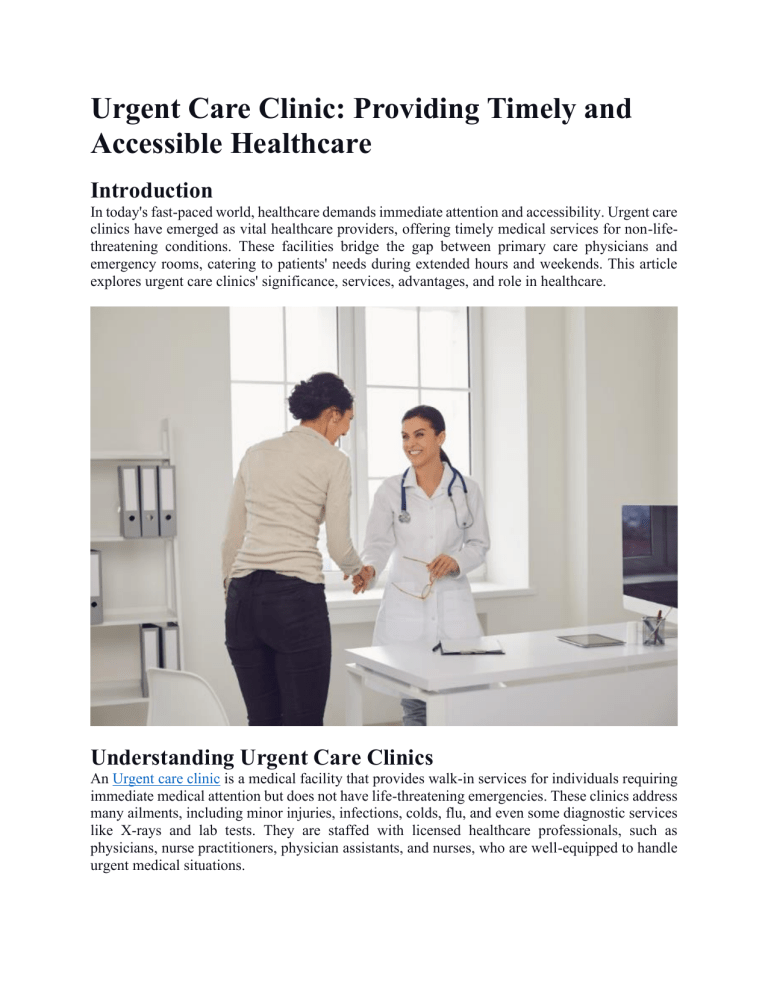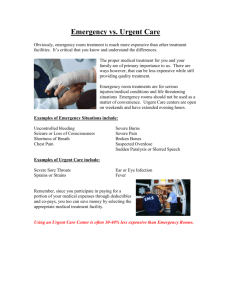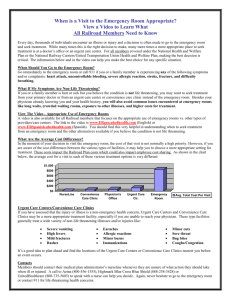
Urgent Care Clinic: Providing Timely and Accessible Healthcare Introduction In today's fast-paced world, healthcare demands immediate attention and accessibility. Urgent care clinics have emerged as vital healthcare providers, offering timely medical services for non-lifethreatening conditions. These facilities bridge the gap between primary care physicians and emergency rooms, catering to patients' needs during extended hours and weekends. This article explores urgent care clinics' significance, services, advantages, and role in healthcare. Understanding Urgent Care Clinics An Urgent care clinic is a medical facility that provides walk-in services for individuals requiring immediate medical attention but does not have life-threatening emergencies. These clinics address many ailments, including minor injuries, infections, colds, flu, and even some diagnostic services like X-rays and lab tests. They are staffed with licensed healthcare professionals, such as physicians, nurse practitioners, physician assistants, and nurses, who are well-equipped to handle urgent medical situations. Accessibility and Convenience One of the primary advantages of urgent care clinics is their accessibility and convenience. Unlike primary care physicians, who may require scheduled appointments, urgent care clinics welcome walk-ins, allowing patients to seek medical attention without delay. This flexibility is especially crucial for those who cannot afford to wait for days to see their regular doctor or those visiting from out of town. Most urgent care centers also operate extended hours, including evenings and weekends, providing round-the-clock access to healthcare services. Reducing Emergency Room Burden Urgent care clinics have played a crucial role in alleviating the burden on emergency rooms. Many patients visit emergency rooms for non-life-threatening conditions, leading to wait longer times and increased costs for patients and healthcare systems. By diverting such cases to urgent care clinics, emergency rooms can focus on treating critical patients more efficiently, ensuring that lifethreatening situations receive immediate attention. Comprehensive and Timely Care Urgent care clinics offer comprehensive medical services, including minor surgical procedures, Xrays, and lab tests. These facilities can quickly diagnose and treat conditions like sprains, strains, minor fractures, and minor infections, ensuring patients receive prompt and appropriate care. Moreover, patients can conveniently obtain prescribed medications with an on-site pharmacy before leaving the clinic. Cost-Effectiveness Another notable advantage of urgent care clinics is their cost-effectiveness. Emergency care centers provide more affordable medical services than emergency room visits, where costs can escalate rapidly. Patients can avoid the substantial expense of emergency room care for non-lifethreatening conditions and receive quality treatment at a fraction of the cost. Community Outreach and Public Health Urgent care clinics often play an essential role in community outreach and public health initiatives. These clinics can offer vaccinations, flu shots, and other preventive services, contributing to public health. Additionally, by providing accessible healthcare options, urgent care centers help identify health issues early, promoting better disease management and reducing the severity of illnesses. Limitations and Considerations While urgent care clinics offer numerous benefits, they do have certain limitations. These clinics may not have specialized medical equipment or expertise for complex conditions, which might require referral to a specialized facility or emergency room. Moreover, patients with severe or lifethreatening emergencies should always seek immediate care at a hospital's emergency department. Conclusion Urgent care clinics have become integral to the modern healthcare landscape, offering timely, accessible, and cost-effective medical services for non-life-threatening conditions. Their ability to reduce the burden on emergency rooms, provide comprehensive care, and contribute to public health makes them valuable assets to communities. As healthcare needs continue to evolve, urgent care clinics will likely remain at the forefront of delivering high-quality medical care promptly and efficiently.



